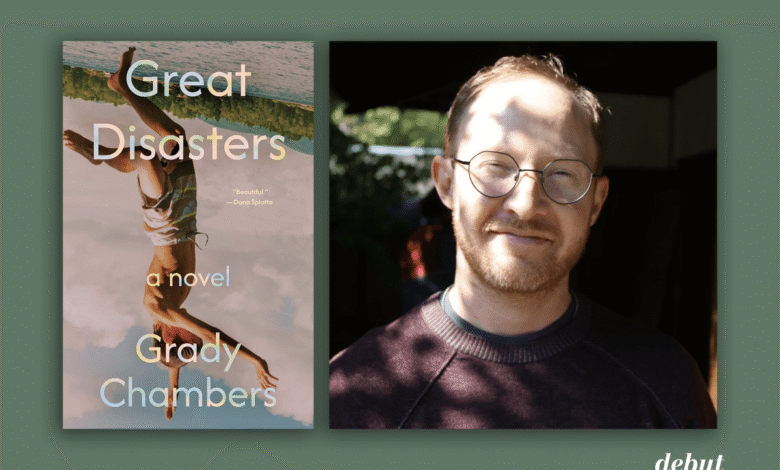Great Disasters author Grady Chambers wants teens to read more contemporary books in school – debutiful

In his debut novel, Great Disasters, Grady Chambers traces the lives of six men coming of age in early-2000s Chicago, as friendship, first love, protest, and war shape the bonds that push and pull them. Chambers captures the humor, heartbreak, and hope that can be found even in moments of loss and devastation. He is also the author of the poetry collection North American Stadiums, which won the Max Ritvo Poetry Prize, and his work has appeared in The Atlantic, The Paris Review, American Poetry Review, and The Sun.
We asked Chambers to answer our recurring My Reading Life Q&A so readers could get to know the books that shaped his life and what influenced his debut novel.
What was the first book you were obsessed with as a child?
The Polar Express holds a special place, because my parents read it to my sister and I just once a year—on Christmas Eve, of course. Winter! Bells! Trains at night! Hot Chocolate! Presents! Snow! What could be better?
What book helped you through puberty?
I wouldn’t quite say this book helped me through puberty (what a time!), but I recall reading The Catcher in the Rye for the first time when I was in seventh or eighth grade and I sense in hindsight that it was an important encounter. It was illuminating to read something considered “Great Literature” that had such a youthful voice. It made that world feel more accessible to me, and Holden Caulfield’s voice and tone was definitely influential to the voice of the narrator in Great Disasters, who (I think) has something of a youthful, sometimes irreverent voice, and, like Holden Caulfield, is someone who I think a reader may feel they know more about than the character knows about himself. I’ll also share that somehow I still have never read Are You There God? It’s Me, Margaret, but did recently watch Kelly Fremon Craig’s 2023 film adaptation of the book, and it’s absolutely incredible. Go see it!
What book do you think all teenagers should be assigned in school?
That’s a tough one for me. I think rather than putting forward one book, I’ll say that I think it’d be helpful for teenagers be exposed to at least as much contemporary prose as canonical works (and I’d tip the scales towards contemporary if it were up to me). Moby Dick is one of my favorite books on earth, but whenever I return to it I’m in disbelief that someone would assign that book to like, sixth graders. It’s wonderful! And very funny! But difficult! When I used to teach, the fiction my students tended to like best was fiction that spoke in a more contemporary voice and that represented people and situations that didn’t feel totally foreign to the world around them—Bonnie Jo Campbell comes to mind, some Jhumpa Lahiri stories, Kiese Laymon’s Heavy, Maile Meloy, Zadie Smith, Dave Eggers’ great and moving story “After I Was Thrown Into the River and Before I Drowned,” which is narrated by a dog. I want to mention Mark Richard’s collection The Ice At the Bottom of the World, too, because he’s an astonishing writer and I cherish the stories in that collection, and he has some unforgettable youthful narrators. And this has all been my long-winded way of saying that I think the first task is to help young people love books, love stories, and help them see that moving, powerful work can be written in the same voice and diction with which they speak. And trust that that love will help them find their way back in time.
If you were to teach a class on Damn Good Writing, what books would make the syllabus?
To The Lighthouse (Virgina Woolf), The Killer Angels (Michael Shaara), The Interpreter of Maladies (Jhumpa Lahiri), Mrs. Lonelyhearts and The Day of the Locust (Nathanael West), A Manual for Cleaning Women (Lucia Berlin), Moby Dick (Herman Melville), Red Cavalry (Isaac Babel), The Fire Next Time (James Baldwin), Katalin Street (Magda Szabo), Jesus’ Son (Denis Johnson), Recitatif (Toni Morrison), Tinkers (Paul Harding), Howl (Allen Ginsberg).
What books helped guide you while writing your book?
Tonally and thematically I think William Maxwell’s So Long, See You Tomorrow had a quiet but important impact. Seven or eight years ago a friend suggested I read that book (very good recommendation, Ben) and I think there’s perhaps a shadow of its voice and tone in my own. Both feature narrators who are kind of haunted by the past, but less by the relation of past events to their own lives and more the relation of those events to the lives of people they knew when they were young. The emotional impact our respective stories seek to achieve hinge on the yearning for things to have gone differently coupled with, of course, the impossibility of altering what took place. Alice Munro’s aching and haunting short story, “Face”, stands out to me too as doing something similar. But I also wanted a liveliness and a bit of irreverence to the narrator’s voice, and there’s lots to be learned from The Catcher in the Rye (evidently, I really love that book) about how to do that!
What books are on your nightstand now?
Virginia Woolf’s To the Lighthouse is always close by—the “Time Passing” section is so beautiful to me and one of my favorite sequences in anything I’ve ever read. Dana Spiotta’s Eat the Document (another guiding light for Great Disasters) has been a great companion, and Bruce Smith’s incredible book of poems, Devotions, is a constant fixture. I’ve also been reading and loving Chris Beha’s novel, The Index of Self-Destructive Acts. It is so good, and I was excited to find that it shares a lot thematically with Great Disasters.
Source link
